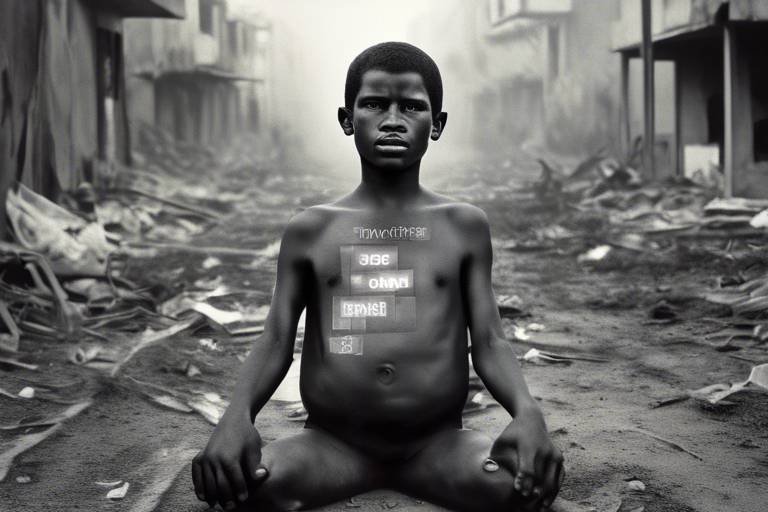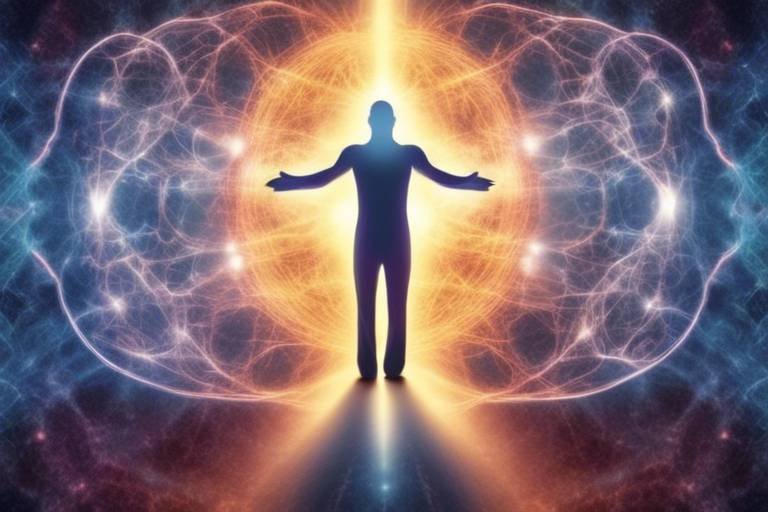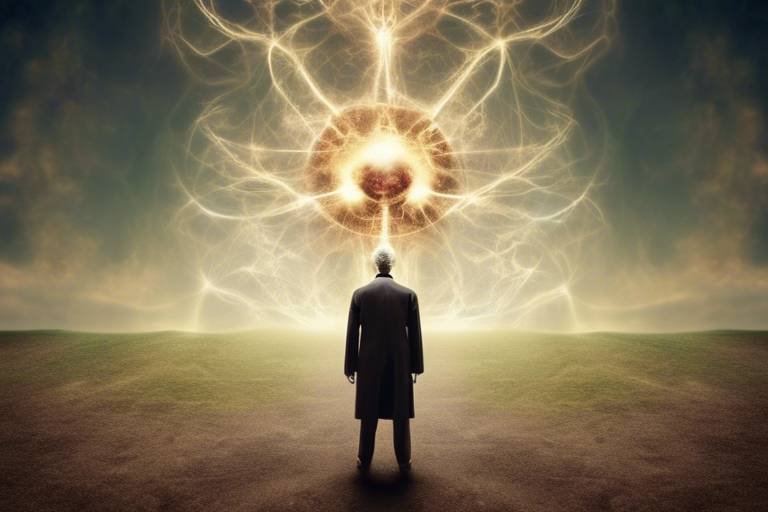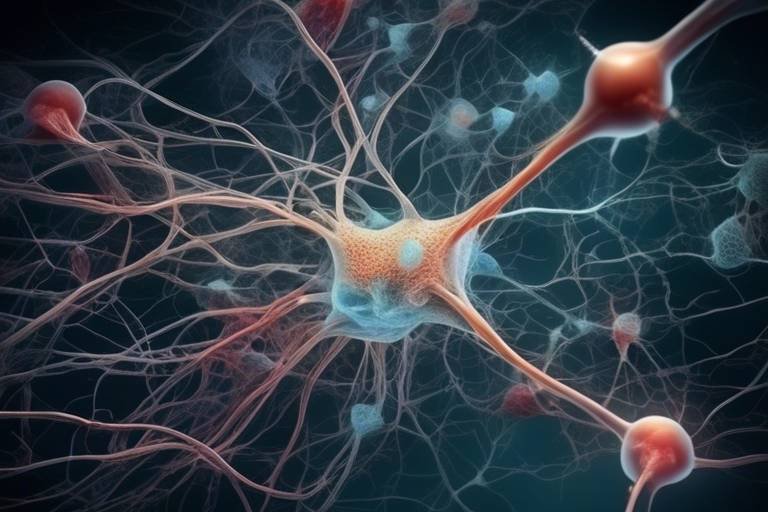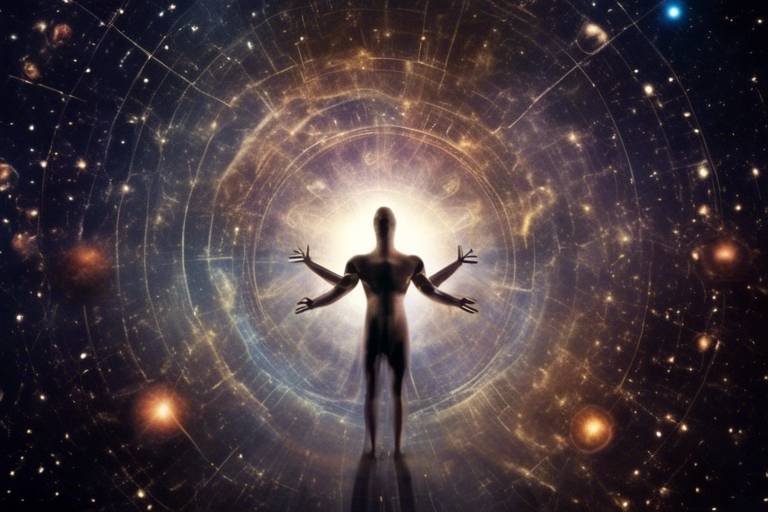Unveiling the Metaphysical Nature of the Universe
Have you ever looked up at the night sky and felt a sense of wonder? The stars twinkling above, the vastness of space stretching infinitely, and the mysteries that lie beyond our reach—these elements stir something deep within us. This article explores the profound aspects of the universe that transcend physical reality, delving into metaphysical concepts, philosophies, and their implications for our understanding of existence and consciousness.
Metaphysics serves as the foundation for understanding reality beyond the physical realm. It’s like the blueprint of existence, mapping out the unseen forces and principles that govern our universe. Historically, metaphysics has roots in ancient philosophies, with thinkers like Aristotle laying the groundwork for inquiry into what lies beyond the tangible world. In essence, it seeks to answer questions that science often leaves untouched—questions about existence, reality, and the nature of being. By examining these profound concepts, we can better appreciate the rich tapestry of life and the universe.
Imagine for a moment that the universe is not just a vast expanse of stars and planets, but a dynamic, interconnected living entity. This perspective invites us to see ourselves as integral parts of a larger whole. Just like the cells in our bodies work together to sustain life, every element in the cosmos plays a role in the grand design. This interconnectedness suggests that our consciousness is not separate from the universe; rather, it is intertwined with it, influencing and being influenced in a continuous dance of existence. It raises the question: if we are all connected, how does our individual consciousness shape the collective experience of the universe?
When we explore the idea of interconnectedness, we begin to see the universe as a web of relationships. Each action we take sends ripples through this web, affecting not just ourselves but the entire cosmos. For instance, consider the concept of the butterfly effect—how a butterfly flapping its wings in one part of the world can lead to a tornado in another. This analogy illustrates that even the smallest actions can have profound consequences. In our daily lives, it's crucial to recognize that our choices matter. They contribute to the collective experience, shaping the reality we share.
Consciousness is the lens through which we perceive reality. It colors our experiences and shapes our understanding of the universe. Think of it as a filter that can either clarify or distort the truth. The more we expand our consciousness—through learning, introspection, and experience—the more we can perceive the deeper layers of reality. This exploration of consciousness leads us to consider how our thoughts and beliefs influence our interactions with the universe. Are we merely observers, or do we play an active role in creating our reality?
Quantum physics has revolutionized our understanding of reality, suggesting that the universe operates on principles that defy traditional logic. It posits that particles exist in multiple states until observed, implying that the act of observation itself influences reality. This idea aligns closely with metaphysical concepts, reinforcing the notion that consciousness plays a crucial role in shaping our experience of the universe. The implications are staggering: if our consciousness can affect reality, what does that mean for our ability to manifest our desires and intentions?
Metaphysical concepts challenge our traditional views of time and space, suggesting they are not rigid constructs but rather fluid and interconnected. Imagine time as a river, where past, present, and future flow together, influencing one another. This perspective invites us to reconsider how we perceive our experiences and the universe around us. It opens the door to a more holistic understanding of existence, where everything is interwoven in a tapestry of time and space, inviting us to explore the depths of our reality.
Have you ever noticed how your thoughts can shape your reality? This is the essence of the metaphysical principle of intention. It suggests that our beliefs and desires can influence the outcomes we experience in life. By harnessing the power of intention, we can align ourselves with universal principles to create the reality we desire. It's like planting a seed in the garden of the universe—what you nurture will grow. So, what do you want to cultivate in your life?
Manifestation is the process of bringing our desires into reality through focused intention. Techniques such as visualization, affirmations, and goal-setting can help individuals align their thoughts and beliefs with their desired outcomes. It’s essential to approach manifestation with an open heart and mind, allowing the universe to respond to your intentions. Think of it as tuning into a radio station; when you align with the right frequency, you’ll receive the messages you’re meant to hear.
Meditation and mindfulness practices are vital tools for connecting with the metaphysical aspects of existence. They foster deeper awareness and understanding of the universe, enabling us to tap into the infinite potential within ourselves. Through these practices, we can quiet the noise of the external world and listen to the whispers of our inner selves. It’s in this stillness that we can truly connect with the universe and unlock the mysteries of our existence.
- What is metaphysics? Metaphysics is a branch of philosophy that explores the fundamental nature of reality, existence, and the universe beyond the physical.
- How does consciousness influence reality? Consciousness shapes our perceptions and experiences, and it can actively influence the reality we create through our thoughts and intentions.
- Can intention really shape outcomes? Yes, the principle of intention suggests that our beliefs and desires can significantly influence the outcomes we experience in life.
- What role does quantum physics play in metaphysics? Quantum physics supports metaphysical ideas by suggesting that the observer's consciousness can affect the state of reality.

The Essence of Metaphysics
Metaphysics, at its core, serves as a profound foundation for understanding reality beyond the tangible and physical realm. It’s like the invisible thread that weaves the fabric of our existence, connecting everything from the smallest particle to the vast cosmos. Historically, metaphysics has been a cornerstone of philosophical inquiry, dating back to the ancient Greeks, where thinkers like Aristotle laid the groundwork for what we now consider metaphysical thought. This branch of philosophy invites us to ponder questions that transcend mere physical observation—questions about existence, reality, and the nature of being itself.
Imagine standing on the shore of an infinite ocean, gazing at the waves as they crash against the rocks. Each wave represents a different facet of reality, while the ocean symbolizes the vast, often uncharted territory of metaphysical inquiry. As we dive deeper into this ocean, we encounter various currents—ideas and theories that challenge our understanding of existence. For instance, metaphysics encourages us to explore the essence of objects, the nature of time and space, and the relationship between mind and matter. These inquiries not only broaden our comprehension of the universe but also invite us to reflect on our place within it.
One significant aspect of metaphysics is its ability to shape philosophical thought across various cultures and epochs. From Eastern philosophies that emphasize the interconnectedness of all beings to Western traditions that often separate mind from body, metaphysical concepts have evolved, yet they consistently provoke deep contemplation. In this way, metaphysics acts as a bridge between empirical science and spiritual understanding, offering a holistic view of existence that encompasses both the seen and unseen.
As we navigate the complexities of metaphysical thought, it’s essential to recognize its implications on our daily lives. The questions posed by metaphysics—such as "What is reality?" and "What is consciousness?"—are not merely academic; they resonate deeply within our personal experiences. By engaging with these profound inquiries, we not only enrich our understanding of the universe but also cultivate a more meaningful existence. The essence of metaphysics lies in its capacity to inspire wonder, provoke thought, and ultimately guide us toward a deeper connection with the cosmos.

The Universe as a Living Entity
When we think about the universe, it’s easy to envision it as a vast expanse filled with stars, planets, and galaxies, all floating in an endless void. But what if I told you that the universe is much more than just a collection of matter? Imagine the universe as a dynamic, interconnected living entity, pulsating with life and consciousness. This perspective challenges our traditional views and invites us to see the cosmos as a vibrant tapestry, where every thread is woven together in a complex dance of existence.
Just like a living organism, the universe exhibits signs of growth, evolution, and interconnectedness. Think about it: every action we take reverberates through the cosmos. When you smile at a stranger or lend a helping hand, those small acts ripple outwards, affecting the world in ways we might never fully comprehend. This interconnectedness emphasizes the idea that we are not isolated beings but rather integral parts of a grand cosmic design.
To further explore this concept, consider the following points:
- Consciousness and the Cosmos: The universe is not just a backdrop for our lives; it actively participates in shaping our experiences. Our thoughts and emotions resonate with the universe, influencing the reality we perceive.
- Interdependence: Just as cells in a body rely on one another to function, every component of the universe relies on the others. The stars, planets, and even the smallest particles are bound together in a complex web of relationships.
- Vibrational Energy: Everything in the universe vibrates at its own frequency. When we align our personal vibrations with the universal energy, we tap into a greater source of wisdom and creativity.
This living entity perspective aligns beautifully with various philosophical and spiritual teachings throughout history. Many ancient cultures viewed the universe as a sentient being, imbued with spirit and purpose. For instance, Indigenous philosophies often emphasize the sacredness of nature and the interconnectedness of all life. This holistic view invites us to respect and honor the world around us, recognizing that our well-being is intrinsically linked to the health of the universe.
Moreover, this understanding of the universe as a living entity has profound implications for our personal lives. It encourages us to take responsibility for our actions and their impact on the greater whole. When we recognize that we are part of a larger system, we become more mindful of our choices, fostering a sense of unity and compassion. It’s like being part of a grand orchestra where every note matters; if one instrument plays out of tune, the entire composition is affected.
In essence, embracing the idea of the universe as a living entity opens up new avenues for exploration and understanding. It invites us to question our role within this cosmic dance and inspires us to engage with the universe in a more meaningful way. So, the next time you gaze up at the night sky, remember that you are not just an observer but a vital participant in this magnificent symphony of existence.
Q: How does the concept of the universe as a living entity change our perception of reality?
A: Viewing the universe as a living entity encourages us to see ourselves as interconnected with everything around us. It fosters a sense of responsibility and awareness of how our actions impact the greater whole.
Q: Can our consciousness really influence the universe?
A: Many philosophies and quantum physics suggest that consciousness plays a significant role in shaping our reality. Our thoughts and intentions can resonate with the cosmic energy, potentially influencing outcomes.
Q: What practical steps can I take to align with the universe?
A: Practicing mindfulness, meditation, and intentional living can help you connect with the universe. Being aware of your thoughts and actions can create a positive ripple effect in your life and the lives of others.

The Interconnectedness of All Things
Have you ever stopped to ponder just how deeply connected everything in the universe truly is? It's a fascinating thought, isn’t it? The idea that every action, every thought, and every being is part of a vast tapestry of existence can be both exhilarating and humbling. This notion of interconnectedness suggests that we are not isolated entities wandering aimlessly through space; rather, we are integral threads in the intricate fabric of the cosmos. Imagine a spider's web, where each strand supports the whole structure—this is how our lives, actions, and the universe are intertwined.
From the smallest atom to the grandest galaxy, everything resonates with a unique frequency, contributing to the symphony of existence. Scientists have long recognized this interconnectedness, particularly in fields like ecology and physics. For instance, in nature, the delicate balance of ecosystems illustrates how the survival of one species can profoundly affect others. The extinction of a single bee species can lead to a domino effect, impacting plants and animals, and ultimately affecting human life. This is a clear reminder that our actions—whether positive or negative—can ripple through the universe in unexpected ways.
But it’s not just in nature where we see this interconnectedness; it’s also deeply rooted in our human experiences. Think about your relationships with family, friends, and even strangers. Every interaction you have creates a ripple effect, influencing not just your life but also the lives of those around you. It’s a beautiful dance of energy, where every smile, word, and gesture contributes to the collective human experience. This interconnected web of relationships highlights the importance of empathy and understanding. When we recognize that our actions impact others, we are more likely to act with kindness and compassion.
Moreover, this interconnectedness extends beyond our physical interactions. Our thoughts and intentions also play a crucial role in shaping our reality. When we focus on positive thoughts, we not only uplift ourselves but also send out vibrations that can inspire and elevate those around us. It’s as if we are all tuning into the same radio frequency, where our collective consciousness can either harmonize or create dissonance. This metaphor of frequency is particularly relevant in understanding how our inner states can affect the outer world.
To illustrate this point, let’s consider a simple table that highlights various aspects of interconnectedness:
| Aspect | Description |
|---|---|
| Ecological Interconnectedness | How species rely on each other for survival, forming a balanced ecosystem. |
| Human Relationships | The impact of our actions and words on the lives of others, creating a web of influence. |
| Consciousness | The collective thoughts and intentions that shape our shared reality. |
In conclusion, recognizing the interconnectedness of all things invites us to approach life with greater awareness and responsibility. It challenges us to reflect on how our choices resonate throughout the universe. The next time you feel isolated or disconnected, remember that you are part of a magnificent whole—a vibrant, interconnected web of existence. Embrace this truth, and you may find that your life—and the lives of those around you—transforms in beautiful, unexpected ways.

The Role of Consciousness
Consciousness is often viewed as the lens through which we perceive the world around us. It's not just a passive observer; rather, it actively shapes our experiences and interactions with the universe. Imagine consciousness as a vibrant tapestry, woven from threads of thoughts, emotions, and perceptions, each contributing to the overall picture of our reality. This intricate interplay suggests that our awareness is not merely a byproduct of brain activity, but rather a fundamental aspect of existence itself.
To understand the role of consciousness, we must first acknowledge its profound influence on our reality. Every thought we entertain, every emotion we feel, and every intention we set sends ripples through the fabric of the universe. Think of it as throwing a stone into a calm pond; the ripples extend outward, affecting everything in their path. This is where the notion of collective consciousness comes into play. It's the idea that our individual consciousnesses are interconnected, forming a vast network that transcends physical boundaries.
Furthermore, consciousness allows us to explore the metaphysical dimensions of existence. It prompts us to ask questions like, “What is the nature of reality?” and “How do our perceptions shape our experiences?” This inquiry leads to a deeper understanding of our place in the cosmos. When we engage with these questions, we begin to recognize that our consciousness is not separate from the universe; it is an integral part of it. Just as a wave is part of the ocean, our consciousness is a manifestation of the greater cosmic consciousness.
In practical terms, the role of consciousness can be observed in our daily lives. For instance, consider how our beliefs influence our actions. If we believe that we are capable of achieving our goals, we are more likely to take the necessary steps to make those goals a reality. Conversely, if we harbor doubts and fears, those negative thoughts can hinder our progress. This is where the concept of self-fulfilling prophecies comes into play, illustrating how our expectations can shape our outcomes.
Moreover, the impact of consciousness extends beyond the individual. When we collectively focus our consciousness on positive intentions, we can create a ripple effect that influences the world around us. This is evident in movements that seek social change or environmental awareness, where the collective consciousness of individuals can lead to significant transformations. It's a reminder that we are not isolated beings; our thoughts and intentions resonate with others, creating a shared reality.
In conclusion, consciousness is not just a passive observer of the universe; it is a dynamic force that shapes our perceptions, influences our actions, and connects us to the greater whole. By understanding and harnessing the power of our consciousness, we can navigate the complexities of existence with greater awareness and intention. As we delve deeper into the metaphysical nature of the universe, we begin to see that our consciousness is not only a tool for understanding our reality but also a powerful catalyst for creating it.
- What is consciousness? Consciousness is the state of being aware of and able to think about one's own existence, thoughts, and surroundings.
- How does consciousness influence reality? Our consciousness shapes our perception of reality, impacting our thoughts, beliefs, and actions, which in turn can affect the outcomes we experience.
- Can collective consciousness affect social change? Yes, when individuals focus their consciousness on shared intentions, it can create a powerful movement that leads to significant societal transformations.
- What role does meditation play in understanding consciousness? Meditation helps deepen our awareness of consciousness, allowing us to connect with the metaphysical aspects of existence and fostering a greater understanding of our place in the universe.

The Implications of Quantum Physics
When we dive into the world of quantum physics, we find ourselves in a realm that defies our conventional understanding of reality. It's like peering into a cosmic kaleidoscope, where the rules of the universe twist and turn in ways that challenge our perception. At the heart of this fascinating field lies the idea that the act of observation plays a crucial role in shaping reality. Imagine for a moment that the universe is a stage, and every time we look, we are not just spectators but active participants in the unfolding drama. This notion suggests that our consciousness is intertwined with the fabric of existence itself.
One of the most intriguing concepts in quantum physics is the phenomenon known as superposition. This principle posits that particles can exist in multiple states simultaneously until they are observed. Think of it like a coin spinning in the air; it is neither heads nor tails until it lands. This idea opens up a myriad of possibilities, hinting that reality is not as fixed as we once believed. Instead, it suggests that potentiality is woven into the very essence of the universe. In essence, our perceptions and intentions can influence the outcomes we experience.
Furthermore, the concept of entanglement adds another layer of complexity to our understanding of the universe. When two particles become entangled, their states become linked, regardless of the distance separating them. This phenomenon implies that everything in the universe is interconnected at a fundamental level, challenging the notion of separateness. It’s a bit like having a twin; no matter how far apart you are, there’s an unbreakable bond that ties you together. This interconnectedness suggests that our thoughts and actions resonate throughout the cosmos, impacting not just our immediate surroundings but the universe as a whole.
In light of these principles, we can draw significant metaphysical implications. Quantum physics encourages us to reconsider our relationship with reality and the universe. It invites us to ponder questions such as: Are we merely observers in a predetermined reality, or do we possess the power to shape our experiences? Could our thoughts and intentions ripple through the fabric of space-time, influencing the very nature of existence? These questions provoke a profound shift in how we view ourselves and our place in the universe.
To summarize, the implications of quantum physics extend far beyond the laboratory. They beckon us to explore the mystical interplay between consciousness and reality. As we venture deeper into this quantum landscape, we uncover a universe that is not just a collection of particles but a living, breathing entity, rich with potential and interconnectedness. The more we understand these principles, the more we realize that we are not separate from the cosmos but an integral part of its grand tapestry.
- What is quantum physics?
Quantum physics is a branch of physics that studies the behavior of matter and energy at the smallest scales, such as atoms and subatomic particles. It reveals phenomena that differ significantly from classical physics, including superposition and entanglement.
- How does quantum physics relate to metaphysics?
Quantum physics raises questions about the nature of reality, consciousness, and the interconnectedness of all things, which are central themes in metaphysical inquiry.
- Can our thoughts influence reality?
While scientific evidence is still emerging, many interpretations of quantum physics suggest that observation and intention may play a role in shaping outcomes, echoing metaphysical principles.

The Nature of Time and Space
When we think about time and space, we often visualize them as linear and fixed dimensions—like a straight road stretching infinitely in both directions. But what if I told you that metaphysical concepts challenge this traditional view? Imagine time not as a relentless march forward, but as a fluid tapestry woven with the threads of our experiences. In this sense, time becomes a rich, multidimensional experience where the past, present, and future are intricately connected, rather than isolated moments.
In the realm of metaphysics, time is often perceived as a construct of human consciousness. This perspective invites us to reconsider our understanding of reality. What if the past is not just a collection of events that have happened, but a living memory that shapes our present? Similarly, the future isn't merely a series of events waiting to unfold; it’s a realm of infinite possibilities influenced by our current intentions and actions. This concept aligns with the idea that space is not just an empty void but a vibrant field of energy where everything is interconnected.
To illustrate this, consider the notion of spatial dimensions. Traditionally, we think of space in three dimensions—length, width, and height. However, metaphysical explorations suggest that there may be additional dimensions beyond our perception. Just as a two-dimensional being might struggle to comprehend the third dimension, we too may be limited by our understanding of the universe. The idea of multiverses and alternate realities expands our comprehension of space, suggesting that countless possibilities exist simultaneously, waiting to be explored.
Moreover, the relationship between time and space is beautifully captured in the theory of relativity, which posits that time can bend and stretch depending on the observer's speed and gravity. This scientific perspective aligns with metaphysical views that challenge the rigidity of our perceptions. Just as a river flows and changes shape, so too does our experience of time and space shift depending on our consciousness and awareness. Our thoughts and emotions can alter our experience of time, making moments feel fleeting or expansive.
As we dive deeper into these metaphysical concepts, we begin to see the profound implications they have on our lives. If time and space are interconnected and influenced by our consciousness, what does that mean for our ability to shape our reality? It suggests that by altering our perceptions and intentions, we can navigate through the fabric of time and space in ways that align with our deepest desires. This transformative understanding empowers us to become active participants in our existence rather than passive observers.
In conclusion, the nature of time and space is not merely a scientific inquiry but a metaphysical exploration that invites us to expand our consciousness. By embracing the idea that these dimensions are fluid and interconnected, we open ourselves up to a world of possibilities. We can harness the power of our thoughts and intentions to create the realities we desire, transcending the limitations imposed by traditional views of time and space.
- What is the metaphysical view of time? The metaphysical view of time suggests that it is not linear but a fluid experience influenced by consciousness.
- How does space relate to consciousness? Space is seen as an interconnected field of energy, where our consciousness can shape and influence experiences.
- Can our thoughts really alter our perception of time? Yes, our thoughts and emotions can significantly impact how we experience time, making it feel either slow or fast.
- What are multiverses in metaphysics? Multiverses refer to the idea that multiple realities or dimensions exist simultaneously, each with its own possibilities.

The Power of Intention
Have you ever noticed how your thoughts can shape your reality? It’s almost like magic, isn’t it? The concept of intention is more than just a fleeting thought; it’s a powerful force that can influence the outcomes of our lives. When we set an intention, we’re not merely wishing for something to happen; we’re actively participating in the creation of our own reality. This is where metaphysics comes into play, revealing the profound connection between our inner world and the external universe.
At its core, the power of intention is about alignment. When you align your thoughts, beliefs, and actions with your deepest desires, you tap into a universal energy that can help manifest those desires into reality. Think of intention as a magnetic force that draws experiences, opportunities, and people to you. It’s like tuning into a radio station; when you find the right frequency, the music starts to play. But how do we harness this power effectively?
One essential aspect of setting intentions is clarity. You need to be clear about what you want to manifest. Vague intentions often lead to vague results. Instead of saying, “I want to be happy,” try specifying what happiness looks like for you. For instance, “I intend to cultivate joy through meaningful relationships and fulfilling work.” This clarity acts as a roadmap, guiding your thoughts and actions toward your desired destination.
Moreover, consistency is key. Just like a seed needs regular watering to grow, your intentions require ongoing attention and nurturing. This doesn’t mean obsessing over them; rather, it’s about consistently reminding yourself of your goals and aligning your daily actions with those intentions. This could be through daily affirmations, vision boards, or even simple reminders on your phone. The more you engage with your intentions, the more they become a part of your reality.
Another vital component is the emotional energy behind your intentions. Emotions act as the fuel that propels your intentions into the universe. When you set an intention with a strong emotional charge, it resonates more deeply with the cosmos. For example, if you’re intending to attract abundance, feel the joy and gratitude as if you already have it. This emotional alignment amplifies the power of your intention, making it more potent and effective.
To illustrate the power of intention further, let’s take a look at a simple table that outlines the key elements involved in manifesting your desires:
| Element | Description |
|---|---|
| Clarity | Define your intentions clearly to avoid ambiguity. |
| Consistency | Regularly engage with your intentions through actions and reminders. |
| Emotional Energy | Infuse your intentions with strong, positive emotions. |
In addition to clarity, consistency, and emotional energy, it’s also essential to let go of any resistance or doubt that may hinder your progress. This is often the hardest part. We all have limiting beliefs that can create barriers to our intentions. Identifying and challenging these beliefs is crucial. Ask yourself: What fears or doubts are holding me back? By addressing these barriers, you can create a clear pathway for your intentions to manifest.
Finally, one of the most transformative practices for harnessing the power of intention is meditation. Through meditation, you can quiet the mind, connect with your inner self, and focus your energy on your intentions. It’s like tuning an instrument before a concert; when you’re in harmony with your inner self, you can play the music of your life with grace and purpose. So, why not carve out a few minutes each day to meditate on your intentions? You might be surprised by the profound shifts that occur in your life.
- What is the difference between intention and wishful thinking?
Intention is a focused and purposeful decision to create a desired outcome, while wishful thinking lacks the commitment and action needed to manifest change. - Can anyone harness the power of intention?
Absolutely! Anyone can harness this power by being clear about their desires and aligning their thoughts and actions accordingly. - How long does it take to see results from setting intentions?
The timeline varies for everyone. Some may see results quickly, while others may take time. Consistency and emotional energy play significant roles in the manifestation process.

Have you ever wondered how your thoughts can shape your reality? The concept of manifestation revolves around the idea that our thoughts, beliefs, and intentions can influence the world around us. It’s like being the director of your own movie, where every thought is a scene that contributes to the final cut of your life. When you focus on what you desire, you are essentially sending out a signal to the universe, inviting those desires to materialize. But how does this process work, and what are the steps to effectively manifest your dreams?
At its core, manifestation is about aligning your energy with your intentions. This alignment creates a magnetic force that attracts similar energy from the universe. Imagine standing in front of a radio; if you tune into the right frequency, you’ll hear your favorite song. Similarly, by tuning your thoughts and emotions to a positive frequency, you can attract experiences that resonate with that energy. It’s not just about thinking positively; it’s about embodying the feelings associated with your desires. For instance, if you want to attract abundance, you must feel abundant in your daily life, even before the physical signs of abundance appear.
One effective technique for manifestation is the use of visualization. This involves creating a mental image of what you wish to achieve. Picture yourself living in your dream home, thriving in your ideal job, or enjoying fulfilling relationships. The more vivid and detailed your visualization, the stronger the energy you emit into the universe. You might also consider keeping a vision board, which is a collage of images and affirmations that represent your goals. This serves as a daily reminder of what you are working towards, helping to keep your focus sharp and your energy aligned.
Another crucial aspect of manifestation is the practice of gratitude. By expressing gratitude for what you already have, you raise your vibration and open the door for more positive experiences. It’s like watering a plant; the more you nurture it, the more it grows. You can start a gratitude journal where you jot down things you are thankful for each day. This simple act can transform your mindset, making you more receptive to the good things the universe has in store for you.
However, it’s important to remember that manifestation is not just about wishing for things to happen. It requires action. The universe responds to your intentions, but it also expects you to take steps towards your goals. This might mean pursuing opportunities, learning new skills, or simply being open to change. Think of it like planting a seed; you can’t just bury it in the ground and wait for it to sprout. You need to water it, provide sunlight, and nurture it to see it grow.
As you embark on your manifestation journey, it’s essential to stay patient and trust the process. Sometimes, things may not unfold as quickly as you’d like, but that doesn’t mean your efforts are in vain. The universe has its own timing, and often, the best outcomes come from unexpected places. Embrace the journey, and remember that every step you take is a part of your growth.
To sum it up, manifestation is a powerful tool for creating your reality. By aligning your thoughts, feelings, and actions with your desires, you can invite the universe to collaborate with you in bringing your dreams to life. So, what are you waiting for? Start manifesting your desires today, and watch as the universe responds to your call!
- What is manifestation? Manifestation is the process of bringing your desires into reality by aligning your thoughts, beliefs, and actions with your intentions.
- How can I start manifesting? Begin by clarifying your desires, using visualization techniques, practicing gratitude, and taking actionable steps towards your goals.
- Does manifestation really work? Many people believe that manifestation works based on the principle of energy alignment, where positive thoughts attract positive outcomes.
- How long does it take to see results from manifestation? The timeline for manifestation varies for everyone and depends on factors such as your beliefs, actions, and the complexity of your desires.

The Role of Meditation and Mindfulness
Meditation and mindfulness are not just trendy buzzwords; they are powerful practices that can profoundly influence our understanding of the universe and our place within it. Imagine standing at the edge of a vast ocean, feeling the waves gently lap at your feet. Each wave represents a thought, a feeling, or an experience. When you meditate, you learn to observe these waves without getting swept away by them. This practice cultivates a sense of inner peace and clarity, allowing you to connect with the metaphysical aspects of existence. It’s like tuning into a radio frequency that opens up a whole new world of understanding and awareness.
Incorporating meditation into your daily routine can lead to transformative experiences. You might find that you become more attuned to the subtle energies around you, recognizing the interconnectedness of all things. Through mindfulness, you learn to live in the present moment, which is where all the magic happens. When you are fully present, you can appreciate the beauty of life and the intricate tapestry of the universe. This awareness can lead to a deeper understanding of how your thoughts and actions ripple through the cosmos, affecting not only your reality but also the reality of those around you.
The benefits of meditation and mindfulness extend beyond personal well-being. They can also serve as tools for manifesting your intentions. When you practice mindfulness, you become aware of your thoughts and beliefs, which are the very foundations of your reality. By aligning your intentions with a clear and focused mindset, you can harness the power of the universe to create the life you desire. This process is not about simply wishing for things to happen; it involves actively engaging with the universe and recognizing that you are a co-creator of your reality.
Research has shown that regular meditation can lead to significant changes in brain function and structure, enhancing areas related to emotional regulation and self-awareness. A study published in the journal Psychological Science found that participants who engaged in mindfulness meditation experienced increased emotional intelligence and improved focus. These findings underscore the importance of meditation as a tool for personal growth and metaphysical exploration.
Moreover, meditation can help bridge the gap between science and spirituality. As quantum physics reveals the interconnectedness of all matter, meditation allows us to experience this interconnectedness firsthand. When you meditate, you might feel a sense of unity with the universe, as if you are not just a separate entity but a vital part of a greater whole. This realization can be both humbling and empowering, igniting a desire to explore the mysteries of existence more deeply.
In conclusion, the role of meditation and mindfulness in understanding the metaphysical nature of the universe cannot be overstated. These practices are gateways to deeper awareness, allowing us to tap into the infinite possibilities that lie before us. By cultivating a regular meditation practice, we open ourselves to the profound truths of existence, enhancing our connection to the cosmos and empowering us to manifest our intentions with clarity and purpose.
- What is the difference between meditation and mindfulness?
Meditation is a practice that involves focusing your mind to achieve a state of calm and clarity. Mindfulness, on the other hand, is the practice of being fully present and aware of your thoughts and feelings without judgment. - How can I start meditating?
You can start by finding a quiet space, sitting comfortably, and focusing on your breath. Allow your thoughts to come and go without engaging with them, gradually increasing the duration as you become more comfortable. - How often should I meditate?
Ideally, aim for at least 10-15 minutes daily. Consistency is key to experiencing the benefits of meditation and mindfulness.
Frequently Asked Questions
- What is metaphysics?
Metaphysics is a branch of philosophy that explores the fundamental nature of reality, including concepts like being, existence, and the universe. It goes beyond the physical realm, seeking to understand what lies beneath the surface of our everyday experiences.
- How does the universe function as a living entity?
The idea that the universe is a living entity suggests that it is not just a collection of matter but a dynamic, interconnected whole. This perspective emphasizes the relationships among all things and how consciousness plays a role in shaping our understanding of the cosmos.
- What is the significance of interconnectedness in the universe?
Interconnectedness highlights that everything in the universe is linked. This means that our actions, thoughts, and intentions can have a ripple effect, impacting not just ourselves but the entire cosmos. Understanding this can lead to a greater sense of responsibility and awareness in our interactions.
- How does consciousness influence our perception of reality?
Consciousness acts as a lens through which we perceive the world. It shapes our experiences, beliefs, and interactions, suggesting that our thoughts can influence the reality we experience. By understanding this connection, we can navigate our lives more intentionally.
- What are the implications of quantum physics on metaphysical concepts?
Quantum physics supports many metaphysical ideas, particularly the notion that reality is not fixed and can be influenced by observation. This challenges traditional views of a deterministic universe, suggesting instead that our consciousness plays a crucial role in shaping reality.
- How do metaphysical concepts redefine our understanding of time and space?
Metaphysical perspectives propose that time and space are not rigid constructs but rather fluid and interconnected. This challenges conventional views and invites a more holistic understanding of how we experience existence and the universe.
- Can intention really shape reality?
Yes! The principle of intention suggests that our thoughts and beliefs can significantly influence outcomes in our lives. By aligning our intentions with universal principles, we can actively participate in the creation of our desired realities.
- What role does meditation play in understanding metaphysics?
Meditation fosters a deeper connection with the metaphysical aspects of existence. It enhances our awareness, allowing us to explore our consciousness and the universe more profoundly, ultimately leading to greater understanding and insight.
- How can I practice manifestation effectively?
To practice manifestation, start by clarifying your intentions and visualizing your desired outcomes. Techniques such as affirmations, vision boards, and mindfulness can help align your thoughts and beliefs with the reality you wish to create.







